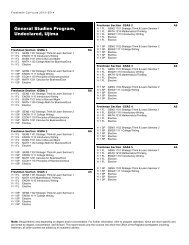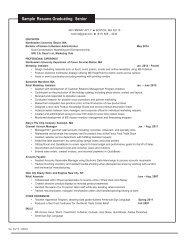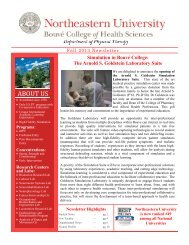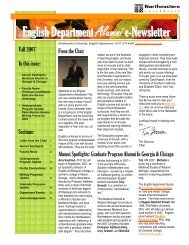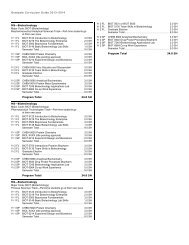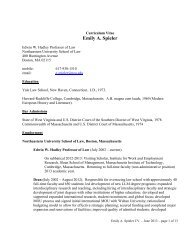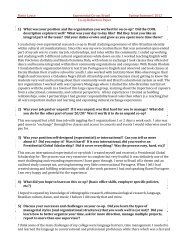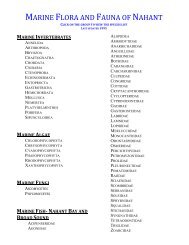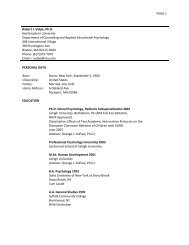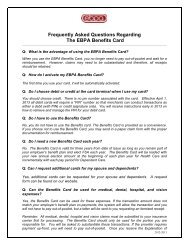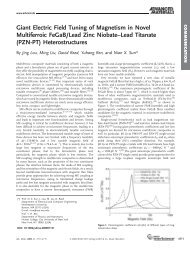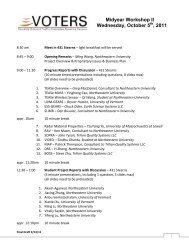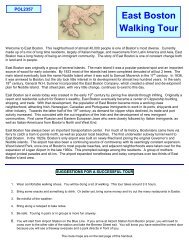2012-2013 Biotechnology Programs Guidebook - Northeastern ...
2012-2013 Biotechnology Programs Guidebook - Northeastern ...
2012-2013 Biotechnology Programs Guidebook - Northeastern ...
Create successful ePaper yourself
Turn your PDF publications into a flip-book with our unique Google optimized e-Paper software.
<strong>Guidebook</strong><br />
<strong>Biotechnology</strong> <strong>Programs</strong><br />
Bouvé College of Health Sciences<br />
College of Science<br />
<strong>2012</strong>-<strong>2013</strong>
<strong>Northeastern</strong> University Mission Statement:<br />
To educate students for a life of fulfillment and accomplishment.<br />
To create and translate knowledge to meet global and societal needs.<br />
<strong>Biotechnology</strong> <strong>Programs</strong> Goal Statement:<br />
To educate students with a core scientific and technological knowledge<br />
and to equip them with the professional skills necessary for them<br />
to rapidly integrate into and become valued members of the global<br />
biopharmaceutical workforce.<br />
<strong>Northeastern</strong> University is an equal opportunity/affirmative action Title IX<br />
education institution and employer.<br />
Tuition rates, all fees, rules and regulations, courses, and course content are<br />
subject to revision by the President and the Board of Trustees at any time.<br />
<strong>Northeastern</strong> University is accredited by the New England Association of<br />
Schools and Colleges, Inc.<br />
This <strong>Guidebook</strong> describes the requirements, policies, and procedures<br />
for the M.S. in <strong>Biotechnology</strong> and M.S. in Biopharmaceutical Regulatory<br />
Science programs at <strong>Northeastern</strong> University. Policies and regulations<br />
applying to all graduate programs are established by the University<br />
Graduate Council. Additionally, each graduate degree-granting unit has<br />
further discretion for establishing discipline-specific policies within the<br />
limits defined by the University Graduate Council and the Graduate<br />
School of the College in which the program resides. The policies<br />
contained in this <strong>Guidebook</strong> for M.S. programs in <strong>Biotechnology</strong> and<br />
Biopharmaceutical Regulatory Science are consistent with, and extend,<br />
those stipulated by the <strong>Northeastern</strong> University Graduate Student<br />
Handbook, the Bouvé College of Health Sciences Graduate Policies<br />
and Regulations, and the College of Science Graduate <strong>Programs</strong>. The<br />
student should consult these sources for general regulations, policies<br />
and procedures covering such matters as credit requirements, student<br />
responsibilities, code of conduct, academic and co-curricular life, faculty<br />
rights and responsibilities, personnel policies, benefits, and services.<br />
If any information contained in this booklet conflicts with the general<br />
University policy, then the University policy will prevail. The University<br />
reserves the right to change the information contained in this document.<br />
(August <strong>2012</strong>, material subject to revision.)
Contents:<br />
Office 2<br />
Staff 2<br />
Faculty 2<br />
Adjunct Faculty 3<br />
<strong>Programs</strong> 4<br />
Academic Integrity Policy 4<br />
Internship 5<br />
Graduate Co-op 6
Office<br />
________________________________________________________________<br />
The offices for the <strong>Biotechnology</strong> <strong>Programs</strong> are located in 108, 109, and<br />
110 Hurtig Hall. The laboratory for the program is temporarily located in<br />
416 Mugar Hall. The Bouvé College Graduate Admissions and Student<br />
Services Office is located in 123 Behrakis Health Sciences Center. The<br />
College of Science Graduate Admissions and Student Services Office is<br />
located in 115 Richards Hall.<br />
Staff<br />
________________________________________________________________<br />
James C. Leung, PhD, Academic Director<br />
Cynthia L. Bainton, MBA, Administrative Manager<br />
Christopher L. Egan, MS, Assistant Co-op Coordinator<br />
Ban-An Khaw, PhD, Academic Advisor<br />
Jacqueline Piret, PhD, Academic Advisor<br />
Faculty<br />
________________________________________________________________<br />
Mansoor Amiji, PhD, Distinguished Professor and Chair,<br />
Pharmaceutical Sciences<br />
Eugene A. Bernstein, PhD, Lecturer, Pharmaceutical Sciences<br />
John R. Engen, PhD, Professor, Chemistry and Chemical Biology<br />
Slava Epstein, PhD, Professor, Biology<br />
S. John Gatley, PhD, Professor, Pharmaceutical Sciences<br />
William S. Hancock, PhD, DSc, Bradstreet Chair, Chemistry and<br />
Chemical Biology<br />
Marina Hincapie, PhD, Research Associate Professor, Chemistry and<br />
Chemical Biology<br />
Graham B. Jones, PhD, DIC, Professor and Chair, Chemistry and<br />
Chemical Biology<br />
Barry Karger, PhD, Waters Chair, Chemistry and Chemical Biology<br />
Ban-An Khaw, PhD, Professor, Pharmaceutical Sciences<br />
Kim Lewis, PhD, Distinguished Professor, Biology<br />
2<br />
Ralph H. Loring, PhD, Associate Professor, Pharmaceutical Sciences
Alexandros Makriyannis, PhD, Behrakis Chair, Chemistry and Chemical<br />
Biology, Pharmaceutical Sciences<br />
Jacqueline Piret, PhD, Associate Professor, Biology<br />
Dennis Shaughnessy, MBA (High Tech), JD, MSW (Management),<br />
Executive Professor, Entrepreneurship and Innovation Group<br />
Michail Sitkovsky, PhD, Black Chair, Biology, Pharmaceutical Sciences<br />
Wendy Smith, PhD, Associate Professor and Interim Chair, Biology<br />
Vladimir Torchilin, PhD, DSc, Distinguished Professor,<br />
Pharmaceutical Sciences<br />
Paul Vouros, PhD, Professor, Chemistry and Chemical Biology<br />
Adjunct Faculty<br />
________________________________________________________________<br />
Dmitry Blinder, PhD, Vice President of Manufacturing, ViroGen<br />
Gerard D’Souza, PhD, Assistant Professor,<br />
Massachusetts College of Pharmacy<br />
Curt Fischer, PhD, Electrofuels Lead & Biological Engineer,<br />
Ginkgo Bioworks<br />
James Glick, PhD, Director, Mass Spectrometry Facility,<br />
<strong>Northeastern</strong> University<br />
Ania Knapp, PhD, Principal, New England PharmAssociates<br />
Gary Gray, PhD, Consultant<br />
Matthew Gregas, PhD, Senior Biostatistician,<br />
Clinical Research Program, Children’s Hospital Boston<br />
James C. Leung, PhD, Academic Director, <strong>Biotechnology</strong> <strong>Programs</strong>,<br />
<strong>Northeastern</strong> University<br />
Glover Martin, PhD, Research Fellow,<br />
Harvard-MIT Division of Health Sciences and Technology<br />
Rupa Sawant, PhD, Associate Research Scientist,<br />
Pharmaceutical Sciences, <strong>Northeastern</strong> University<br />
Joseph Zaia, PhD, Associate Professor, Biochemistry,<br />
Boston University School of Medicine<br />
Gregory Zarbis-Papastoitsis, PhD, Senior Director of Protein Production<br />
and Analytical Development, Eleven Biotherapeutics 3
<strong>Programs</strong><br />
________________________________________________________________<br />
M.S. in <strong>Biotechnology</strong>, 34 credits required<br />
M.S. in Biopharmaceutical Regulatory Science, 32 credits required<br />
For course requirements, see program plan for year of entry.<br />
Plus One <strong>Programs</strong> (accelerated):<br />
B.S. in Biochemistry / M.S. in <strong>Biotechnology</strong>, molecular track or<br />
pharmaceutical track<br />
B.S. in Biology / M.S. in <strong>Biotechnology</strong>, molecular track or<br />
pharmaceutical track<br />
• applicant must already be enrolled as an undergraduate of <strong>Northeastern</strong><br />
• a maximum of 17 credits of the graduate program taken as an<br />
undergraduate student can be applied to the undergraduate degree<br />
• a minimum of 17 credits of the graduate program must be taken as a<br />
graduate student<br />
http://www.northeastern.edu/plusone/index.php<br />
Academic Calendar<br />
________________________________________________________________<br />
The <strong>Biotechnology</strong> <strong>Programs</strong> require students to be present at the start<br />
of every semester and to attend final exams. Failure to attend class and<br />
final exams may result in a lower or failing grade. Students are expected<br />
to consult the university’s academic calendar, located on the Registrar’s<br />
website for dates including the first and last day of the semester, final<br />
exam period, last day to register online for a course, and last day to<br />
withdraw from a course. The academic calendar is located at http://<br />
www.northeastern.edu/registrar/calendars.html.<br />
Academic Integrity Policy<br />
________________________________________________________________<br />
No student shall knowingly provide, or accept any unauthorized material<br />
that contains questions or answers to any examination or assignment to<br />
be given at a subsequent time.<br />
4
No student shall complete, in part or in total, any examination or<br />
assignment for another person.<br />
No student shall knowingly allow any examination or assignment to be<br />
completed, in part or in total, for himself/herself by another person.<br />
No student shall plagiarize or copy the work of another person and submit<br />
it as his/her own work.<br />
No student shall employ aids excluded by the instructor in undertaking<br />
course work or in completing any exam or assignment.<br />
No student shall alter graded class assignments or examinations and<br />
then resubmit them for regrading.<br />
No student shall submit substantially the same material in more than one<br />
course without prior authorization.<br />
Academic or research dishonesty will result in disciplinary action, which<br />
may include a failing grade in the course, probation, suspension, or<br />
immediate dismissal from the program.<br />
Internship<br />
____________________________________________<br />
The intent of the internship (paid or unpaid) is to provide exposure to<br />
“real-world” learning in industry, government, teaching hospitals and<br />
academic research labs. It is performed for 0 credits.<br />
Students are responsible for securing their own internship.<br />
It is recommended that students begin their search for the internship prior<br />
to the beginning of the academic semester, due to the fact that the search<br />
may take many weeks.<br />
The internship will be no more than four months in length and will not<br />
exceed 40 hours per week.<br />
Each student is permitted to perform one internship during the program.<br />
Internship Requirements<br />
1. Students must be in good academic standing (a GPA of 3.0 or better).<br />
2. The internship may only be performed prior to the co-op. It cannot<br />
replace the co-op or be performed simultaneously with the co-op.<br />
3. Students must inform Co-op Coordinator when they receive an<br />
internship offer, and/or accept a position.<br />
5
4. International students must be enrolled in BIOT6400 <strong>Biotechnology</strong><br />
Internship and complete appropriate paperwork for the ISSI Office<br />
prior to beginning the internship.<br />
5. Internship start and end dates must coincide with the University’s<br />
semester start and end dates. An exception may be made on the start<br />
date with the approval of the Co-op Coordinator.<br />
6. The internship is a pass/fail course and will appear on the academic<br />
transcript.<br />
7. Upon completion of the internship, students will write a one-page<br />
paper on what they learned during the experience.<br />
8. For students who wish to perform an internship and a co-op at the<br />
same location, there will be a distinction between the two experiences,<br />
see co-op requirements.<br />
Graduate Co-op<br />
________________________________________________________________<br />
The graduate co-op is the major real-world component of the Professional<br />
Master of Science in <strong>Biotechnology</strong> (PSM) Program. We are fortunate<br />
to have a rich practice environment in the immediate Boston area<br />
and anticipate a continued variety of internship opportunities in all life<br />
science disciplines as well as non-science opportunities such as project<br />
management.<br />
Students are responsible for obtaining their own graduate co-op. They<br />
will receive the support and guidance of the <strong>Biotechnology</strong> PSM Program<br />
Graduate Co-op Coordinator throughout the search process and<br />
throughout the co-op. Each student, including international students, will<br />
complete a co-op that provides him/her with an invaluable opportunity<br />
to gain professional training and real-world experience in the commercial<br />
sector. In most instances, the co-op will be paid, however, a paid position is<br />
not guaranteed. Students who intend to pursue additional graduate study<br />
after obtaining the <strong>Biotechnology</strong> PSM degree may wish to consider a coop<br />
in a laboratory at <strong>Northeastern</strong> or at another educational institution in<br />
the area. In some instances, the co-op will serve as a mutually beneficial<br />
preliminary period of employment leading to a permanent position.<br />
The graduate co-op will be three to six months in length, depending on<br />
the requirements of the employment site. The co-op usually occurs in<br />
the summer semester, at the end of the program. All exceptions must<br />
6
e approved by the Graduate Co-op Coordinator. Each student will<br />
perform one graduate co-op. Students with permanent jobs will work<br />
with the Graduate Co-op Coordinator, their work supervisor, and their<br />
academic track advisor to design a special project that meets the co-op<br />
requirement. In the event that a student is not able to secure a co-op, an<br />
experiential unpaid position in a <strong>Northeastern</strong> laboratory will be available.<br />
Students will be enrolled in a reflection seminar at the same time they<br />
are performing their co-op. The seminar is designed to complement<br />
learning during the co-op. Students will participate in activities to<br />
integrate academic learning and experiential learning including written<br />
reflections and weekly reports which will not include company confidential<br />
information.<br />
Graduate Co-op Requirements<br />
1. Students must be approved for an graduate co-op by the Co-op<br />
Coordinator prior to searching for a co-op. Students must be in good<br />
academic standing (a QPA of 3.0 or better). Students will keep in<br />
regular communication with the Co-op Coordinator during the search<br />
and interview process.<br />
2. Students must attend Resume Writing Workshop and have<br />
their resume approved by the Co-op Coordinator prior to having<br />
the resume sent to employers. The workshop will be held at the<br />
beginning of each academic semester (the date, time and location<br />
will be announced). Please note, students who have had their<br />
resume “approved” prior to the workshop by the Graduate Co-op<br />
Coordinator do not have to attend.<br />
3. Students must attend Interviewing Skills Workshop. The workshop will<br />
be held at the beginning of the academic semester and attendance<br />
is mandatory for all those who wish to go on co-op the following<br />
semester. Please note, students who have worked full-time in industry<br />
for 12 months of more do not have to attend the workshop.<br />
4. Students must inform the Graduate Co-op Coordinator when they<br />
receive a job offer, and/or accept a position. Following acceptance of<br />
a position, students must provide job contact information to the Co-op<br />
Coordinator. After that information is provided, key numbers for course<br />
registration will be given to students.<br />
7
Once a student accepts an offer from an employer, the student must<br />
perform that co-op at the employment site during the time period<br />
specified by the employer. The student may not contact other employers,<br />
go on any other interviews, or accept any other offers. Violation of this<br />
policy may result in a failure to graduate from the <strong>Biotechnology</strong> PSM<br />
Program.<br />
International students must complete the above process in advance<br />
of ISSI paperwork (Co-op Authorization Form for International Students,<br />
ISSI 152). ISSI paperwork must be completed prior to beginning a<br />
co-op. It is illegal to begin the co-op if the ISSI paperwork is<br />
incomplete. The Co-op Coordinator is the program representative<br />
responsible for filling out Part 2 of ISSI Form 152 and signing off on<br />
ISSI paperwork. All paperwork must be completed three weeks prior<br />
to the beginning of the co-op. International students who engage<br />
in illegal employment may face immediate dismissal from the<br />
University.<br />
5. Co-op start and end dates must coincide with <strong>Northeastern</strong><br />
University semester start and end dates. An exception may be made<br />
if the employer requests that the student begin earlier because of an<br />
established orientation program or other extenuating circumstances.<br />
All exceptions are subject to the approval of the Co-op Coordinator.<br />
6. The co-op must take place at a bona fide institution and consist of<br />
bona fide work with measurable outcomes. The student’s work<br />
supervisor must be deemed a work supervisor by the institution where<br />
the co-op is performed. Fabrication or falsification of a co-op and/or<br />
a work supervisor qualifies as academic dishonesty and may result in<br />
immediate dismissal from the university.<br />
7. The <strong>Biotechnology</strong> Internship Reflection Seminar will be taken in the<br />
same semester that the co-op is performed. Students must register for<br />
both Co-op Work Experience (BIOT6964) and the Reflection Seminar<br />
(BIOT6411).<br />
8. Students who are employed and wish to perform their co-op at<br />
the company where they work must meet the following additional<br />
requirement:<br />
• Identify a co-op supervisor within the company who is not the current<br />
work supervisor.<br />
8<br />
9. E-mail communications will be sent to students’ neu.edu address.<br />
Students are responsible for checking e-mail regularly, a forwarding<br />
option is available.
<strong>Biotechnology</strong> <strong>Programs</strong><br />
108 Hurtig Hall<br />
<strong>Northeastern</strong> University<br />
360 Huntington Avenue<br />
Boston, MA 02115<br />
Phone: 617.373.2627<br />
Fax: 617.373.8795<br />
E-mal: c.bainton@neu.edu<br />
www.northeastern.edu/biotech/



